Soaring high
The fourth international Galle Literary Festival
opens new avenues for scribes:
Script and pictures by Ruwini Jayawardana and Uvindu
Illeperuma in Galle
Ideologies shaped out of living experiences weaved into discussions
unfurled as the writers, brimming with liveliness and thoughts, roamed
the streets of Galle.
It was a hub of activity and creativity as the Galle Literary
Festival 2010, for the fourth successive year, took to the stage in the
luscious landscapes of Galle, surrounded by the age old fortress and
fanned by the occasional breeze sweeping across the sea.
Not surprisingly soon a range of colourful kites were flying in the
sky as a part of the afternoon sessions of the festival.
The Chitrasena Dance Company and the Ravibandu Vidyapathi Drum
ensemble enchanted the onlookers with their exceptional performances.
Writers unravelled their thoughts, inspiring many to pick up their
pens and piece together sentences and workshops were assembled to train
young and old to borrow into the depths of their creativity.
The area was brimming with activity as photographers clicked away the
striking exhibits on display. All this and many more were in store at
the four-day event which celebrated the best of literary works of some
of the local and international writers in the public eye.
Daily News ‘Artscope’ spoke to three of the leading writers who
shared their thoughts at the opening day of GLF 2010.
Gillian Slovo
Exploring new avenues of literature in the local context are a
hallmark of the GLF. New faces of writers emerge with this aspect. One
of the writers who stole the show was Gillian Slovo, a South African
born novelist, playwright and memoirist.
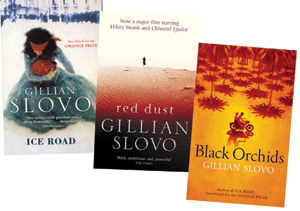 She
is the writer for 11 novels. Some of her works include ‘Red Dust’, ‘Ice
Road’, ‘Morbid Symtoms’, ‘Ties of Blood’, ‘The Betrayal’ and ‘Close
Call’. Her most recent novel Black orchids set partly in the Ceylon is
about outsiders, race and Britain. She
is the writer for 11 novels. Some of her works include ‘Red Dust’, ‘Ice
Road’, ‘Morbid Symtoms’, ‘Ties of Blood’, ‘The Betrayal’ and ‘Close
Call’. Her most recent novel Black orchids set partly in the Ceylon is
about outsiders, race and Britain.
“The reason I chose to set the story in Sri Lanka was due to an
experience I had here. I came back to the country with the urge to feel
the place. However I realized that what I was really looking for was in
the past,” she explained adding that what she had really written was a
book about ‘Paradise Lost’.
“The characters in the novel are looking for an identity in another
location and looking to be themselves at an alien place.”
More than revealing her writing strategies it was her concern to
dwell on what made her to write novels. Gillian went
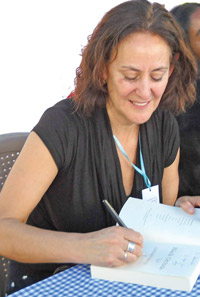 down
memory lane remembering her childhood, the experience she derives from
the family and the traumatic condition she had to confront been in South
Africa at the time when bloody apartheid loomed large. down
memory lane remembering her childhood, the experience she derives from
the family and the traumatic condition she had to confront been in South
Africa at the time when bloody apartheid loomed large.
In the discussion we had with her during the occasion she went onto
unfold how her family was surrounded by the politics of the country.
“The debate on the anti-apartheid struggle was always within my
family. Violence, anti – apartheid struggle and the morality of
violence: everything was discussed in my family. Politically my mother
and father had some different ideas. That’s why I became a writer,” she
pointed out.
Her father and mother were colossal figures in the anti - apartheid
struggle in the face of armed resistance and occasional imprisonment.
Their unabated contribution to the struggle ultimately resulted in her
mother’s murder in 1982.
She reminisced her childhood going parallel with her novel ‘Every
Secret Thing: My Family, My Country’ - her memoir in which she made an
account of her childhood in South Africa and her relationship with her
parents.
She had also co-authored with Victoria Brittain, ‘Guantanamo : Honor
Bound to Defend Freedom’ in 2005.
Shyam Selvadurai
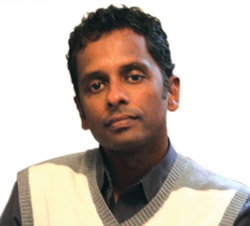 Sri
Lankan Canadian novelist Shyam Selvadurai, the award winning writer of
‘Funny Boy’, ‘Cinnamon Gardens’ and ‘Swimming in the Monsoon Sea’,
announced that he had turned a completely different page in his two new
books. The stories are based on Buddhist Jataka tales. Sri
Lankan Canadian novelist Shyam Selvadurai, the award winning writer of
‘Funny Boy’, ‘Cinnamon Gardens’ and ‘Swimming in the Monsoon Sea’,
announced that he had turned a completely different page in his two new
books. The stories are based on Buddhist Jataka tales.
“Like a lot of immigrant writers I find that a homeward pull inhabits
my creative mind, that it is the capturing of the world I left behind
that haunts my imagination. Yet, without the isolation from that world,
without the act of migration, I wonder if ‘Funny Boy’ would have ever
been written,” Shyam once revealed at an interview on why he keeps
returning to his motherland in his creative works.
He says that a a good narrative needs a good dose of evil and that
basically in a fantasy someone has to be chased.
“I focus on the laws of Karma on what people do and play around with
them. Though I am a Catholic as a writer you need to strip down and get
into others’ shoes,” he noted. Born in 1965 in Colombo, Sri Lanka, Shyam
is the son of a Sinhalese
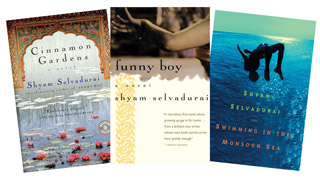 mother
and a Tamil father, members of conflicting ethnic groups whose troubles
form a major theme in his work. mother
and a Tamil father, members of conflicting ethnic groups whose troubles
form a major theme in his work.
Ethnic riots in 1983 drove the family to immigrate to Canada where
Selvadurai studied creative and professional writing as part of a
Bachelor of Fine Arts program at York University.
Selvadurai’s third novel, ‘Swimming in the Monsoon Sea’, was
published in 2005, and targeted to Young Adult readers. Set in 1980 Sri
Lanka, the novel chronicles a 14-year-old Sri Lankan boy’s falling in
love with his visiting Canadian cousin.
On the effect his books may have on other young gay Sri Lankans and
his position as a role model for other gay Asians in North America he
remarked, “I remembered how it was for me feeling there was no one out
there who was a role model of any sort. When I decided to be out in
public, I was really thinking of that version of me in Sri Lanka who
would read my book and feel relieved to not be alone. If I decided not
to be out, I would be sending a message to that young person that I was
still afraid and ashamed.”
Ru Freeman
Her childhood, no doubt, played a key role in shaping her career.
Hailing from a family of writers who also showed a keen interest towards
politics, it’s just a matter of minutes for Ru Freeman to enter the
literary field.
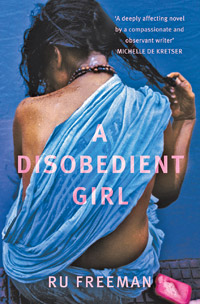
Her debut novel ‘A Disobedient Girl’, brings together the experiences
of two women in the social backdrop of Sri Lanka’s political turbulence.
Latha, a servant girl, who dreams of life beyond her servant’s quarters
and Biso, a young mother, who suffers within the clutches of a brutal
husband are the protagonists of the novel. Both women flee to seek what
destiny has in store for them and the episodes which they encounter are
thrilling, heart-wrenching and true to life.
“I went back to a theme from childhood for my maiden novel -
servants. I always identified with them because I feel that they are in
a position to grasp a lot more than what goes on because they are the
silent observers of situations.
They are not given an opportunity to voice their thoughts. There is a
depth and richness to their thoughts and I wanted to explore on what
goes in there and look at the world through their eyes,” Ru opined on ‘A
Disobedient Girl’.
“I focused on the 1970s. Rather than highlighting violence, mass
deaths, revolution and terrorism my focal point was human beings and how
they face these situations.
“Politics was not an overwhelming factor in the book,” noted Ru who
had worked extensively in the field of humanitarian assistance and
workers’ rights. Her political writing has appeared in English and in
translation.
She confessed that a lot of Biso’s characteristics emerged from her
own mother.
She said: “My mother was a Kurunegala person and had to struggle
through life in the Colombo setting. She was involved a lot with the
theatre.”
Though it is ‘A Disobedient Girl’ which was put into print she first
penned a novel titled ‘Palestine’. The subject of this work is also
close to her heart.
“It is about a dancer who lives in the country. I have done a lot of
research about Palestine and Israel because it is a huge issue in the
States,” explained the
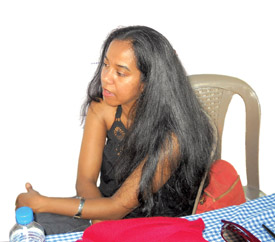 writer
who is also a talented dancer. writer
who is also a talented dancer.
“I did oriental Kandyan dancing in Sri Lanka and then went to college
in USA where I did a lot of modern jazz and theatre. I engage in and
teach Latin ballroom dance,” she said adding that dancing is celebration
of being alive for her and will always be a part of her life.
Her upcoming work will also be set in Sri Lanka and dealing with
ordinary folk.
“There may be people who do not know our country but the story should
be one which any person anywhere could read and understand. It is this
universality which I want to have in my writing,” she concluded.
She is the daughter of Gamini Seneviratne and sister of Malinda
Seneviratne, both of whom are renowned poets and writers. |



